NRSG267, Semester 2: Reflection Assignment on Resilience in Nursing
VerifiedAdded on 2022/10/31
|5
|1155
|243
Report
AI Summary
This reflection assignment, completed for NRSG267, focuses on the concept of resilience in nursing practice. The assignment begins with a description of the simulation experience, followed by an exploration of the student's feelings and thoughts during the scenario. The evaluation section assesses the positive and negative aspects of the simulation, supported by references. An analysis section then connects the simulation to current literature, exploring strategies for managing stress and building resilience in nursing. The conclusion summarizes the key takeaways and the impact of the simulation on the student's understanding. Finally, an action plan outlines how the student intends to apply the lessons learned to future nursing practice, including independent research and proactive approaches to challenges. The assignment highlights the importance of resilience in dealing with workplace stress and the need for nurses to be prepared for various challenges.
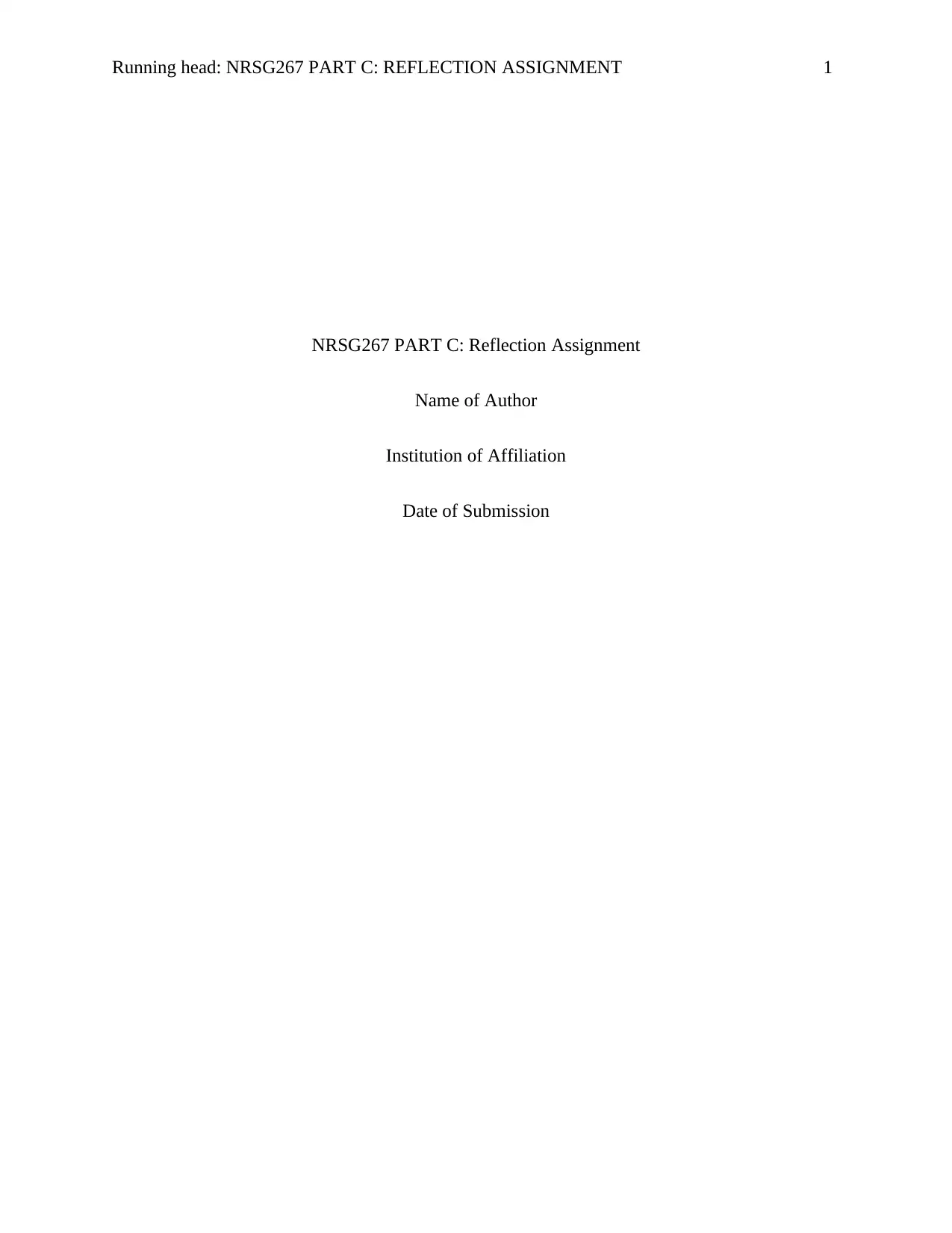
Running head: NRSG267 PART C: REFLECTION ASSIGNMENT 1
NRSG267 PART C: Reflection Assignment
Name of Author
Institution of Affiliation
Date of Submission
NRSG267 PART C: Reflection Assignment
Name of Author
Institution of Affiliation
Date of Submission
Paraphrase This Document
Need a fresh take? Get an instant paraphrase of this document with our AI Paraphraser
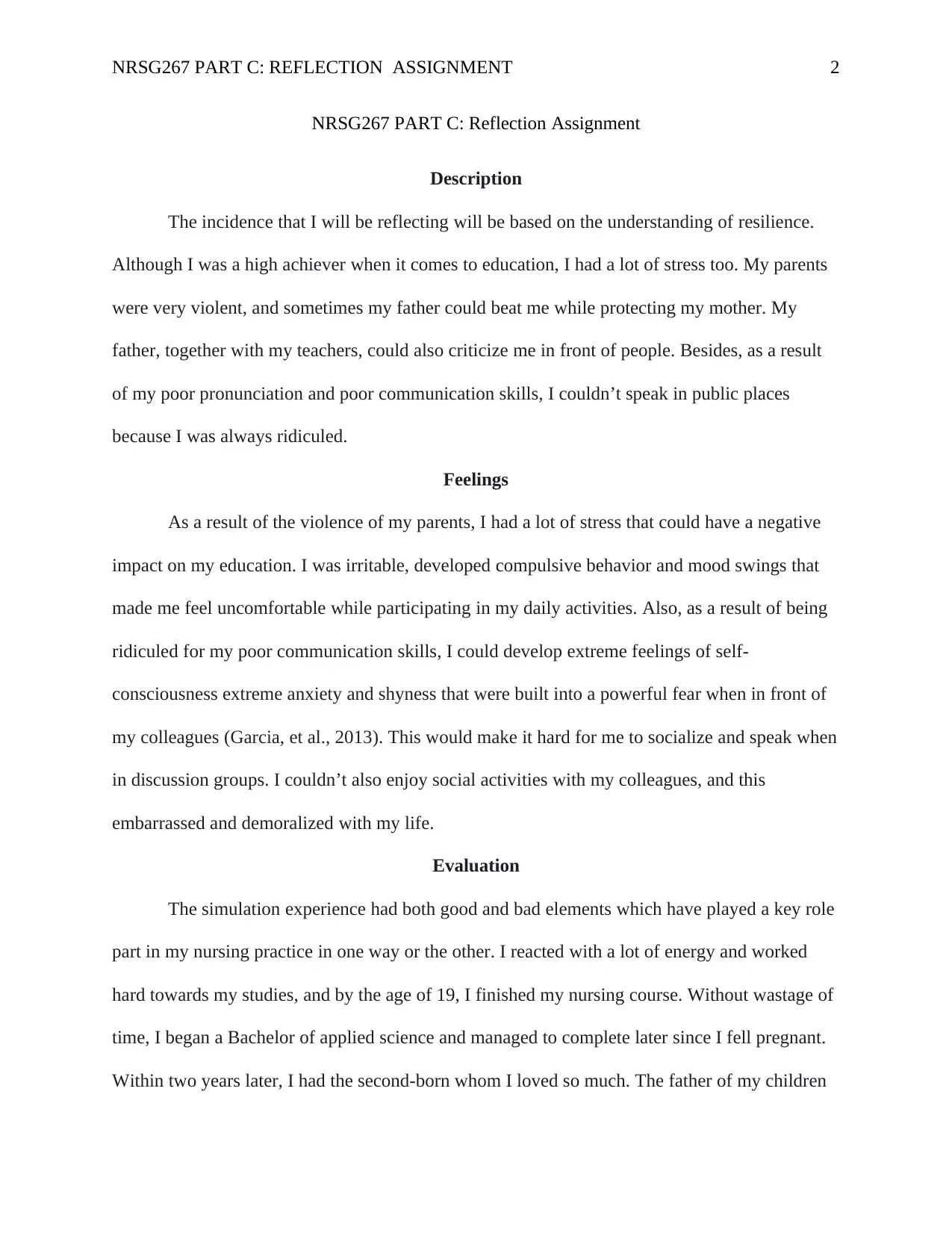
NRSG267 PART C: REFLECTION ASSIGNMENT 2
NRSG267 PART C: Reflection Assignment
Description
The incidence that I will be reflecting will be based on the understanding of resilience.
Although I was a high achiever when it comes to education, I had a lot of stress too. My parents
were very violent, and sometimes my father could beat me while protecting my mother. My
father, together with my teachers, could also criticize me in front of people. Besides, as a result
of my poor pronunciation and poor communication skills, I couldn’t speak in public places
because I was always ridiculed.
Feelings
As a result of the violence of my parents, I had a lot of stress that could have a negative
impact on my education. I was irritable, developed compulsive behavior and mood swings that
made me feel uncomfortable while participating in my daily activities. Also, as a result of being
ridiculed for my poor communication skills, I could develop extreme feelings of self-
consciousness extreme anxiety and shyness that were built into a powerful fear when in front of
my colleagues (Garcia, et al., 2013). This would make it hard for me to socialize and speak when
in discussion groups. I couldn’t also enjoy social activities with my colleagues, and this
embarrassed and demoralized with my life.
Evaluation
The simulation experience had both good and bad elements which have played a key role
part in my nursing practice in one way or the other. I reacted with a lot of energy and worked
hard towards my studies, and by the age of 19, I finished my nursing course. Without wastage of
time, I began a Bachelor of applied science and managed to complete later since I fell pregnant.
Within two years later, I had the second-born whom I loved so much. The father of my children
NRSG267 PART C: Reflection Assignment
Description
The incidence that I will be reflecting will be based on the understanding of resilience.
Although I was a high achiever when it comes to education, I had a lot of stress too. My parents
were very violent, and sometimes my father could beat me while protecting my mother. My
father, together with my teachers, could also criticize me in front of people. Besides, as a result
of my poor pronunciation and poor communication skills, I couldn’t speak in public places
because I was always ridiculed.
Feelings
As a result of the violence of my parents, I had a lot of stress that could have a negative
impact on my education. I was irritable, developed compulsive behavior and mood swings that
made me feel uncomfortable while participating in my daily activities. Also, as a result of being
ridiculed for my poor communication skills, I could develop extreme feelings of self-
consciousness extreme anxiety and shyness that were built into a powerful fear when in front of
my colleagues (Garcia, et al., 2013). This would make it hard for me to socialize and speak when
in discussion groups. I couldn’t also enjoy social activities with my colleagues, and this
embarrassed and demoralized with my life.
Evaluation
The simulation experience had both good and bad elements which have played a key role
part in my nursing practice in one way or the other. I reacted with a lot of energy and worked
hard towards my studies, and by the age of 19, I finished my nursing course. Without wastage of
time, I began a Bachelor of applied science and managed to complete later since I fell pregnant.
Within two years later, I had the second-born whom I loved so much. The father of my children
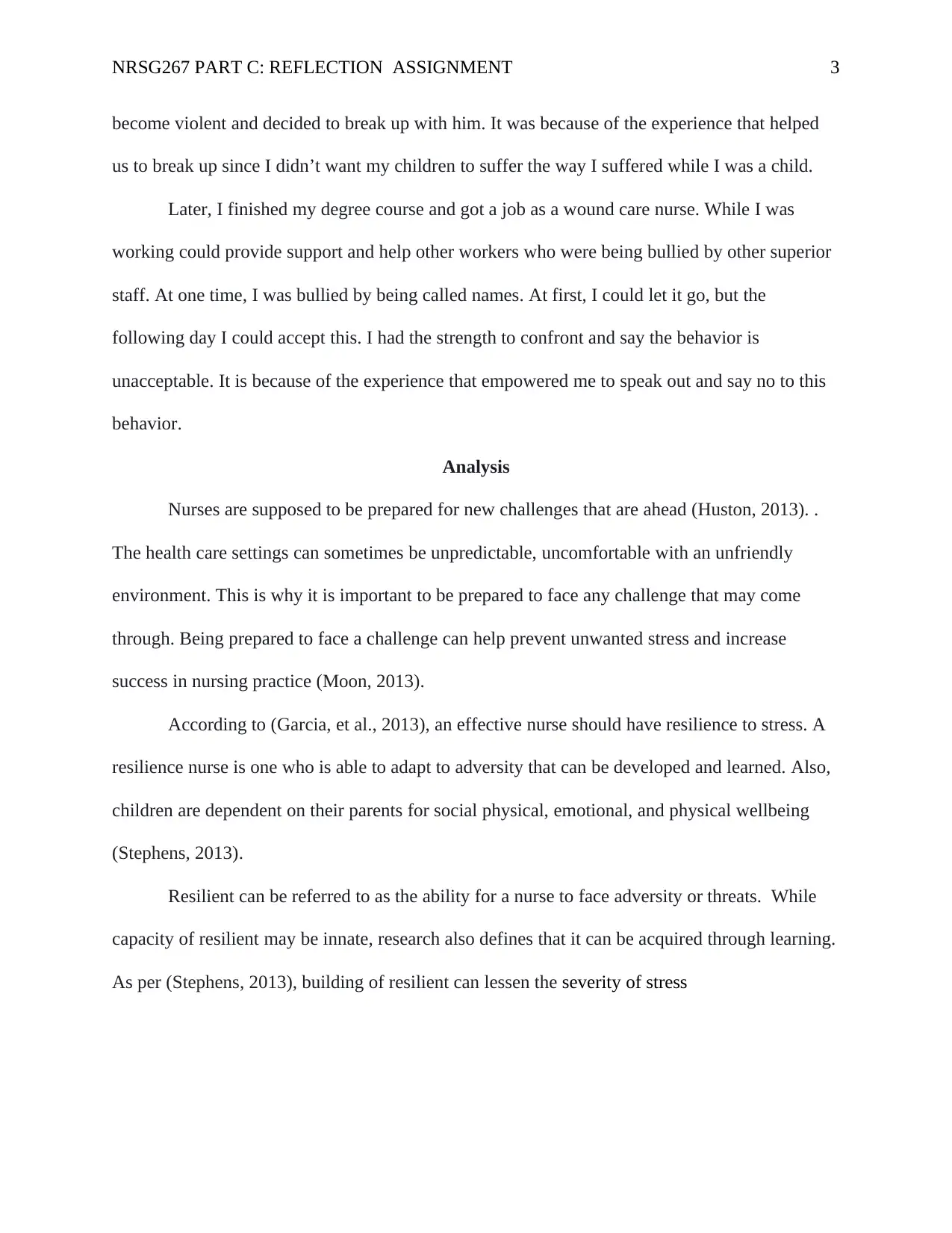
NRSG267 PART C: REFLECTION ASSIGNMENT 3
become violent and decided to break up with him. It was because of the experience that helped
us to break up since I didn’t want my children to suffer the way I suffered while I was a child.
Later, I finished my degree course and got a job as a wound care nurse. While I was
working could provide support and help other workers who were being bullied by other superior
staff. At one time, I was bullied by being called names. At first, I could let it go, but the
following day I could accept this. I had the strength to confront and say the behavior is
unacceptable. It is because of the experience that empowered me to speak out and say no to this
behavior.
Analysis
Nurses are supposed to be prepared for new challenges that are ahead (Huston, 2013). .
The health care settings can sometimes be unpredictable, uncomfortable with an unfriendly
environment. This is why it is important to be prepared to face any challenge that may come
through. Being prepared to face a challenge can help prevent unwanted stress and increase
success in nursing practice (Moon, 2013).
According to (Garcia, et al., 2013), an effective nurse should have resilience to stress. A
resilience nurse is one who is able to adapt to adversity that can be developed and learned. Also,
children are dependent on their parents for social physical, emotional, and physical wellbeing
(Stephens, 2013).
Resilient can be referred to as the ability for a nurse to face adversity or threats. While
capacity of resilient may be innate, research also defines that it can be acquired through learning.
As per (Stephens, 2013), building of resilient can lessen the severity of stress
become violent and decided to break up with him. It was because of the experience that helped
us to break up since I didn’t want my children to suffer the way I suffered while I was a child.
Later, I finished my degree course and got a job as a wound care nurse. While I was
working could provide support and help other workers who were being bullied by other superior
staff. At one time, I was bullied by being called names. At first, I could let it go, but the
following day I could accept this. I had the strength to confront and say the behavior is
unacceptable. It is because of the experience that empowered me to speak out and say no to this
behavior.
Analysis
Nurses are supposed to be prepared for new challenges that are ahead (Huston, 2013). .
The health care settings can sometimes be unpredictable, uncomfortable with an unfriendly
environment. This is why it is important to be prepared to face any challenge that may come
through. Being prepared to face a challenge can help prevent unwanted stress and increase
success in nursing practice (Moon, 2013).
According to (Garcia, et al., 2013), an effective nurse should have resilience to stress. A
resilience nurse is one who is able to adapt to adversity that can be developed and learned. Also,
children are dependent on their parents for social physical, emotional, and physical wellbeing
(Stephens, 2013).
Resilient can be referred to as the ability for a nurse to face adversity or threats. While
capacity of resilient may be innate, research also defines that it can be acquired through learning.
As per (Stephens, 2013), building of resilient can lessen the severity of stress
⊘ This is a preview!⊘
Do you want full access?
Subscribe today to unlock all pages.

Trusted by 1+ million students worldwide
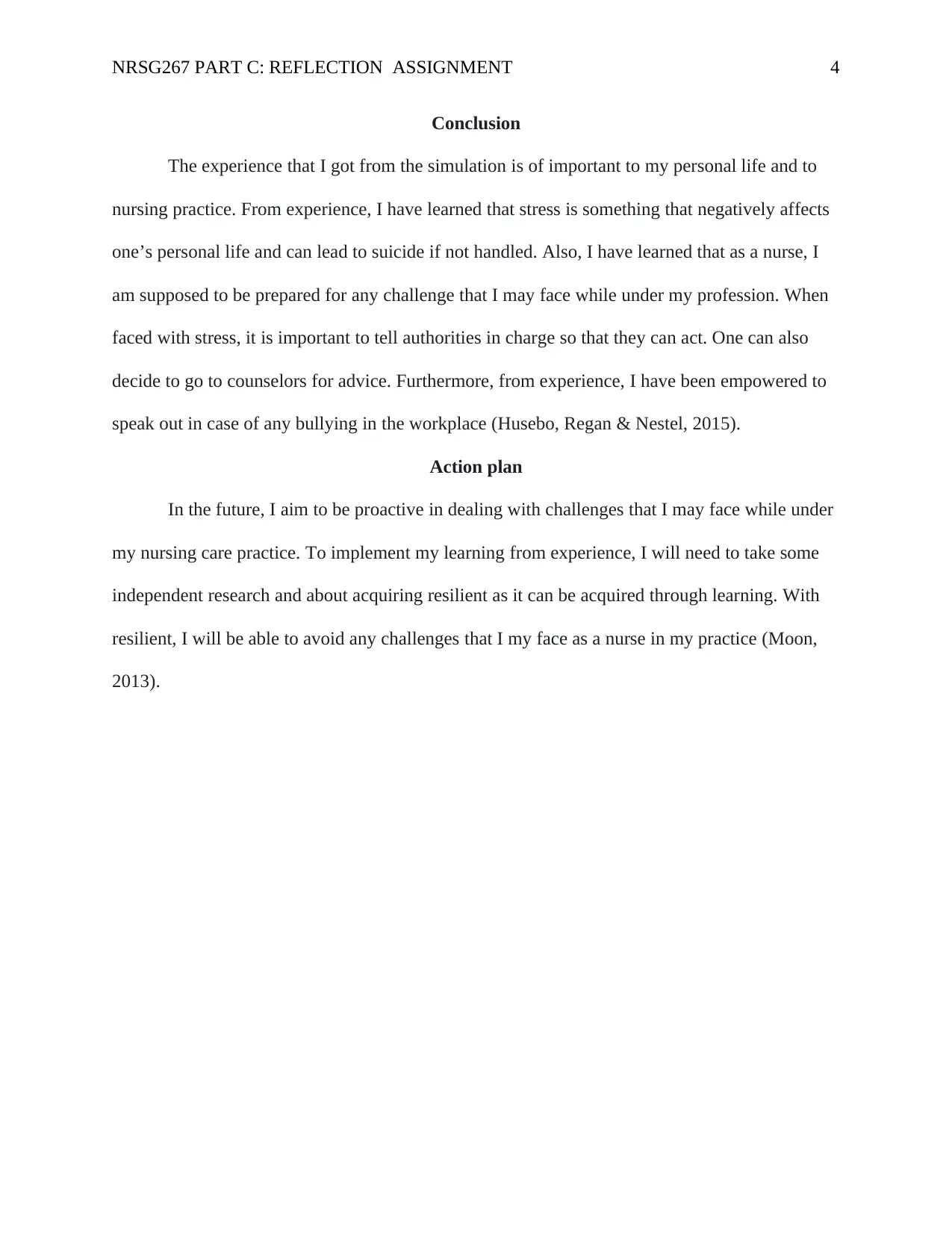
NRSG267 PART C: REFLECTION ASSIGNMENT 4
Conclusion
The experience that I got from the simulation is of important to my personal life and to
nursing practice. From experience, I have learned that stress is something that negatively affects
one’s personal life and can lead to suicide if not handled. Also, I have learned that as a nurse, I
am supposed to be prepared for any challenge that I may face while under my profession. When
faced with stress, it is important to tell authorities in charge so that they can act. One can also
decide to go to counselors for advice. Furthermore, from experience, I have been empowered to
speak out in case of any bullying in the workplace (Husebo, Regan & Nestel, 2015).
Action plan
In the future, I aim to be proactive in dealing with challenges that I may face while under
my nursing care practice. To implement my learning from experience, I will need to take some
independent research and about acquiring resilient as it can be acquired through learning. With
resilient, I will be able to avoid any challenges that I my face as a nurse in my practice (Moon,
2013).
Conclusion
The experience that I got from the simulation is of important to my personal life and to
nursing practice. From experience, I have learned that stress is something that negatively affects
one’s personal life and can lead to suicide if not handled. Also, I have learned that as a nurse, I
am supposed to be prepared for any challenge that I may face while under my profession. When
faced with stress, it is important to tell authorities in charge so that they can act. One can also
decide to go to counselors for advice. Furthermore, from experience, I have been empowered to
speak out in case of any bullying in the workplace (Husebo, Regan & Nestel, 2015).
Action plan
In the future, I aim to be proactive in dealing with challenges that I may face while under
my nursing care practice. To implement my learning from experience, I will need to take some
independent research and about acquiring resilient as it can be acquired through learning. With
resilient, I will be able to avoid any challenges that I my face as a nurse in my practice (Moon,
2013).
Paraphrase This Document
Need a fresh take? Get an instant paraphrase of this document with our AI Paraphraser
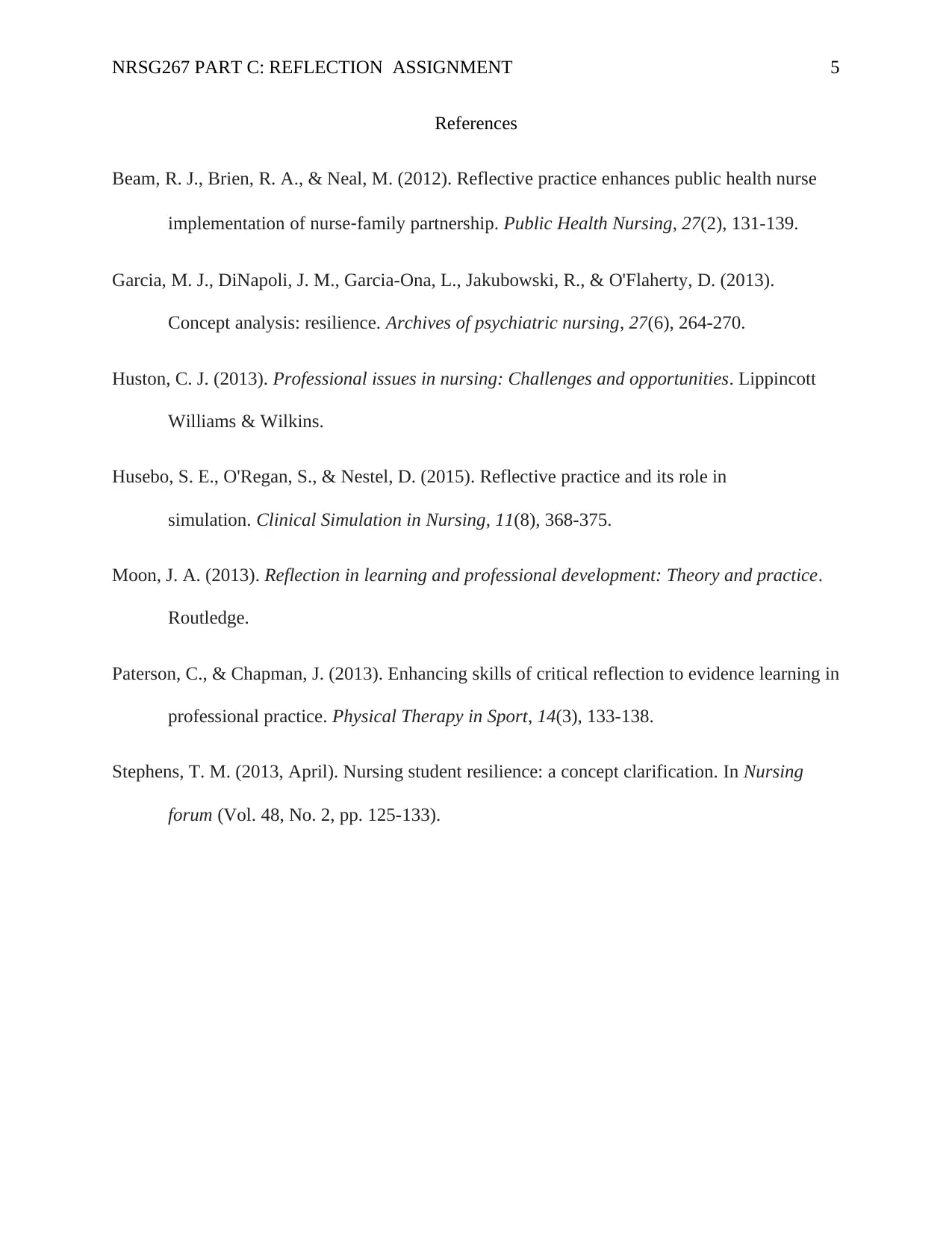
NRSG267 PART C: REFLECTION ASSIGNMENT 5
References
Beam, R. J., Brien, R. A., & Neal, M. (2012). Reflective practice enhances public health nurse
implementation of nurse‐family partnership. Public Health Nursing, 27(2), 131-139.
Garcia, M. J., DiNapoli, J. M., Garcia-Ona, L., Jakubowski, R., & O'Flaherty, D. (2013).
Concept analysis: resilience. Archives of psychiatric nursing, 27(6), 264-270.
Huston, C. J. (2013). Professional issues in nursing: Challenges and opportunities. Lippincott
Williams & Wilkins.
Husebo, S. E., O'Regan, S., & Nestel, D. (2015). Reflective practice and its role in
simulation. Clinical Simulation in Nursing, 11(8), 368-375.
Moon, J. A. (2013). Reflection in learning and professional development: Theory and practice.
Routledge.
Paterson, C., & Chapman, J. (2013). Enhancing skills of critical reflection to evidence learning in
professional practice. Physical Therapy in Sport, 14(3), 133-138.
Stephens, T. M. (2013, April). Nursing student resilience: a concept clarification. In Nursing
forum (Vol. 48, No. 2, pp. 125-133).
References
Beam, R. J., Brien, R. A., & Neal, M. (2012). Reflective practice enhances public health nurse
implementation of nurse‐family partnership. Public Health Nursing, 27(2), 131-139.
Garcia, M. J., DiNapoli, J. M., Garcia-Ona, L., Jakubowski, R., & O'Flaherty, D. (2013).
Concept analysis: resilience. Archives of psychiatric nursing, 27(6), 264-270.
Huston, C. J. (2013). Professional issues in nursing: Challenges and opportunities. Lippincott
Williams & Wilkins.
Husebo, S. E., O'Regan, S., & Nestel, D. (2015). Reflective practice and its role in
simulation. Clinical Simulation in Nursing, 11(8), 368-375.
Moon, J. A. (2013). Reflection in learning and professional development: Theory and practice.
Routledge.
Paterson, C., & Chapman, J. (2013). Enhancing skills of critical reflection to evidence learning in
professional practice. Physical Therapy in Sport, 14(3), 133-138.
Stephens, T. M. (2013, April). Nursing student resilience: a concept clarification. In Nursing
forum (Vol. 48, No. 2, pp. 125-133).
1 out of 5
Related Documents
Your All-in-One AI-Powered Toolkit for Academic Success.
+13062052269
info@desklib.com
Available 24*7 on WhatsApp / Email
![[object Object]](/_next/static/media/star-bottom.7253800d.svg)
Unlock your academic potential
Copyright © 2020–2026 A2Z Services. All Rights Reserved. Developed and managed by ZUCOL.





